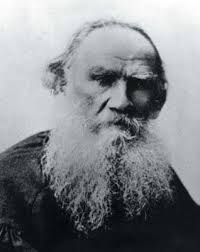When I first read War and Peace by Leo Tolstoy, I was nineteen, in my sophomore year of college, and wasn’t having my particularly best year. But when I began reading that text, I forgot about anything that was occurring around me and in my own world; so much that I sat in one spot for fifteen hours and read the entire text in one sitting. Afterwards I was in a daze. It had pulled me in to a point where nothing in my own world escaped the shine of War and Peace. In the character of Prince Andrei I found one of the great loves of my life and to him I will owe more than I can know. That year I wrote numerous papers on different scenes, but my final project was on Prince Andrei; on his scenes and his attempt to live in his world. I found him struggling with issues that were on my own mind, and watching him lead his life allowed me to live my own. In that first reading I found reflections of myself, and the words that I put together in the text allowed me to put together images of myself.
After that semester I did not read the entirety of War and Peace again for two years. I would read passages whenever my mind and body needed them, but until my senior year I did not attempt to dive back into the world that had gripped me once before.
When I started rereading it in my senior year, we were only assigned 119 pages for the next class. But from the moment my eyes fell upon the thin black streaks on the first page, the salon at Anna Pavlovna’s, every crystal detail from the world reflected off itself and once more I was in the most beautiful world I could imagine. That night I read 350 pages before a friend convinced me to stop. And when I did, I felt like I was betraying someone I loved, leaving them when I knew that all I should be doing was spending every waking moment in their arms. That’s what reading War and Peace was for me; being in love. But that night I realized that one cannot binge on love. I’d already played the game of throwing oneself into it until there’s nothing left. Now I had to learn how to take in little bits, and then learn to comfortably turn away and participate in another activity.
When I first read War and Peace, I needed it to help me construct myself. Now that I have a construction of myself and understand how I constructed myself, I turn to constructing the world. In my rereading of War and Peace I found not only a construction of the world, but a plurality of methods of constructing the world and one’s own freedom. And it is just as necessary to my thought as it was two years ago. The text itself hasn’t changed, but my own thinking has changed, my construction of the text and what I understand from it has changed drastically. I compare my two copies and passages and I find crucial point which went by unnoticed and without underlining two years ago. Going back to something is not about reinforcement; it’s about rediscovery. You want to prove yourself wrong because if nothing has changed then something is wrong. You are constantly becoming, and if the world is a reflection of you, it should also be in a constant state of becoming.
———————————————————————————————————
Marina Manoukian, Sarah Lawrence College
Follow the Campus Clipper on Twitter and Like us on Facebook!
Interested in more deals for students? Sign up for our bi-weekly newsletter to get the latest in student discounts and promotions and follow our Tumblr and Pinterest. For savings on-the-go, download our printable coupon e-book!




